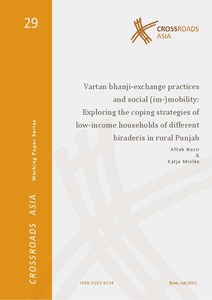Nasir, Aftab; Mielke, Katja: Vartan bhanji-exchange practices and social (im-)mobility: Exploring the coping strategies of low-income households of different biraderis in rural Punjab. Bonn: Competence Network Crossroads Asia: Conflict – Migration – Development, 2015. In: Baldauf, Ingeborg; Conermann, Stephan; Kreutzmann, Hermann; Nadjmabadi, Shahnaz; Reetz, Dietrich; Schetter, Conrad; Sökefeld, Martin; Bech Hansen, Claus Erik; Hornidge, Anna-Katharina; Mielke, Katja (Hrsg.): Crossroads Asia Working Paper Series, 29.
Online-Ausgabe in bonndoc: https://hdl.handle.net/20.500.11811/164
Online-Ausgabe in bonndoc: https://hdl.handle.net/20.500.11811/164
@techreport{handle:20.500.11811/164,
author = {{Aftab Nasir} and {Katja Mielke}},
editor = {{Ingeborg Baldauf} and {Stephan Conermann} and {Hermann Kreutzmann} and {Shahnaz Nadjmabadi} and {Dietrich Reetz} and {Conrad Schetter} and {Martin Sökefeld} and {Claus Erik Bech Hansen} and {Anna-Katharina Hornidge} and {Katja Mielke}},
title = {Vartan bhanji-exchange practices and social (im-)mobility: Exploring the coping strategies of low-income households of different biraderis in rural Punjab},
publisher = {Competence Network Crossroads Asia: Conflict – Migration – Development},
year = 2015,
month = jul,
series = {Crossroads Asia Working Paper Series},
volume = 29,
note = {This paper assesses whether vartan bhanji exchange practices are a boon or a burden, an enabling or disabling factor, a pass or an impasse for social mobility of the poor households of biraderis living in rural areas of Pakistan. Vartan bhanji is an umbrella term that comprises highly obligatory, unfailingly regular and reciprocal social exchange practices in the forms of gifts that are performed over various life-cycle occasions, such as marriage, death, birth, and circumcision ceremonies among biraderi members. Biraderi groups can be conceptualized as a figuration of interdependence. The results of the current study establish that the poor households perceive vartan bhanji more as a necessary evil; a system that they cannot go without, but also the one that they cannot afford to live without either. Even though this very institution restricts their movement in society in subtle ways, it also provides them identity, support, and protection that is essentially needed for their survival and mobility within their social networks. This paper shows that the social mobility of an individual is rather a function of and is restricted to his/her positionality within a biraderi. The limits of one’s exchanges, via vartan bhanji, mark the limit of one’s social (im-)mobility in society as well.},
url = {https://hdl.handle.net/20.500.11811/164}
}
author = {{Aftab Nasir} and {Katja Mielke}},
editor = {{Ingeborg Baldauf} and {Stephan Conermann} and {Hermann Kreutzmann} and {Shahnaz Nadjmabadi} and {Dietrich Reetz} and {Conrad Schetter} and {Martin Sökefeld} and {Claus Erik Bech Hansen} and {Anna-Katharina Hornidge} and {Katja Mielke}},
title = {Vartan bhanji-exchange practices and social (im-)mobility: Exploring the coping strategies of low-income households of different biraderis in rural Punjab},
publisher = {Competence Network Crossroads Asia: Conflict – Migration – Development},
year = 2015,
month = jul,
series = {Crossroads Asia Working Paper Series},
volume = 29,
note = {This paper assesses whether vartan bhanji exchange practices are a boon or a burden, an enabling or disabling factor, a pass or an impasse for social mobility of the poor households of biraderis living in rural areas of Pakistan. Vartan bhanji is an umbrella term that comprises highly obligatory, unfailingly regular and reciprocal social exchange practices in the forms of gifts that are performed over various life-cycle occasions, such as marriage, death, birth, and circumcision ceremonies among biraderi members. Biraderi groups can be conceptualized as a figuration of interdependence. The results of the current study establish that the poor households perceive vartan bhanji more as a necessary evil; a system that they cannot go without, but also the one that they cannot afford to live without either. Even though this very institution restricts their movement in society in subtle ways, it also provides them identity, support, and protection that is essentially needed for their survival and mobility within their social networks. This paper shows that the social mobility of an individual is rather a function of and is restricted to his/her positionality within a biraderi. The limits of one’s exchanges, via vartan bhanji, mark the limit of one’s social (im-)mobility in society as well.},
url = {https://hdl.handle.net/20.500.11811/164}
}






